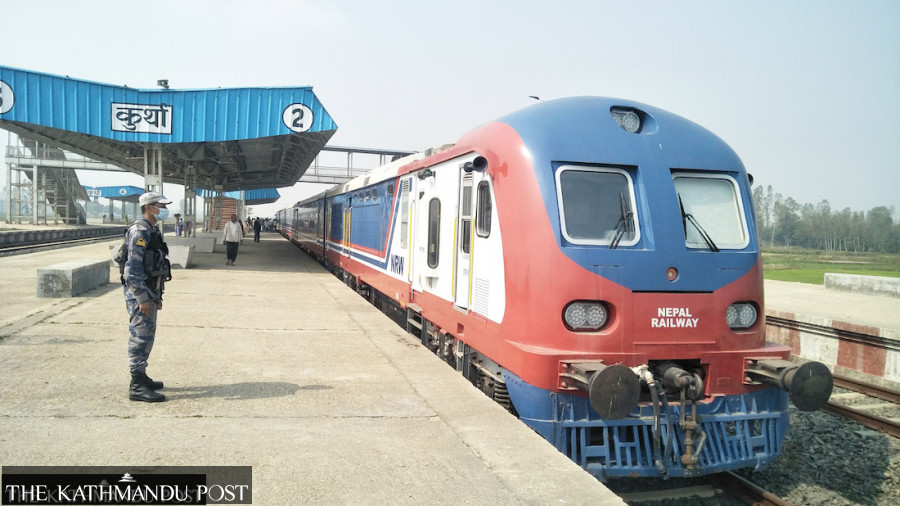National
Nepal aims to expand railway network but lacks essential staff
The country continues to employ Indian technical workers to run the Bijalpura-Jayanagar passenger service.
Prithvi Man Shrestha
Nepal aspires to expand its railway services, with one line in operation and many others in the pipeline. The country, however, is doing little to produce the requisite human resources, say.
Nepal-India railway connecting Bijalpura, Mahottari to Jayanagar across the border in India has been in operation since April 2022 after it was upgraded from a narrow-gauge to a broad-gauge line.
Land acquisition, track opening and studies are ongoing in different parts of the proposed Mechi-Mahakali Electrified Railway.
India’s Konkan Railway Corporation Limited has submitted the final location survey report for the Raxaul-Kathmandu railway while, on the Chinese side, a detailed feasibility study is being undertaken to build a Kerung-Kathmandu railroad.
The country has done little to prepare the human resource necessary to build the railway network as well as to run the railway services.
Nepal Railway Company, a government-owned entity that operates the Bijalpura-Jayanagar service, has employed technical staff including crew members from India’s Konkan Railways Corporation Limited (KRCL) for nearly two years.
As per the agreement with the KRCL, about two dozen technical officers from KRCL such as crew members, lead the operations. About 120 local staff, almost all temporary employees, assist them, according to the Nepal Railway Company.
“Even though Nepali staff were expected to gradually replace Indians, once they are trained, it did not happen. Then, the Nepal Railway Company signed a fresh agreement with KRKL to prolong the service of Indian staff until December 2024,” said Rohit Bisural, director general at the Department of Railways.
India, in meetings of the Joint Working Group on railway cooperation. has promised to help Nepal in the capacity development of the local staff. The issue was also discussed during Prime Minister Pushpa Kamal Dahal’s visit to the southern neighbour in May–June last year.
“We also held discussions on early completion of the works in the remaining segments and sustained operation of these railways through training and capacity building of the Nepali railway personnel,” Prime Minister Dahal said during a joint press meet with his Indian counterpart Narendra Modi on June 2 last year.
According to Bisural, the southern neighbour has been asking the Nepali side to send its railway staff to India for training. “There is hardly any permanent staff at the Nepal Railway Company to run the service. So, we have not been able to send anybody for training to India,” said Bisural. “We cannot send temporary and wage workers as it is uncertain how long they will continue their work at the company.”
Officials said that in order to hire permanent staff, the company has to create posts and recruit staff through tests to be conducted by the Public Service Commission. Hoping to hire permanent staff through the commission, Nepal Railway Company has already conducted an Organisation and Management Survey (O&MS) of the company.
According to Bisural, a survey suggested hiring over 200 staff.
The company, according to officials, is also struggling to run services on the extended section of Bijalpura-Jayanagar Railway, as no new workers have been hired since its extension in July last year.
The service was brought into operation in the 17.3km Kurtha-Bijalapura section of the cross-border railway in July last year.
This section was built in the second phase of the railway project and handed over to Nepal during Prime Minister Dahal’s India visit. Currently, the passenger service is being operated on a 52-km section.
“As no staff have not recruited since the extension of the railway network, Nepal Railway Company is facing difficulty operating the extended network,” said Keshav Kumar Shrestha, secretary at the Ministry of Physical Infrastructure and Transport.
While Nepal Railway does not have Nepali technical staff including crew members to run the railway, little has also been done to prepare railway engineers who will be needed to build rail networks and operate train services.
“The government has not sent anybody to study academic courses on railway engineering in India,” said Bisural. “Three senior staff of the railway department are studying railway in China under Chinese government’s assistance.”




 17.29°C Kathmandu
17.29°C Kathmandu















